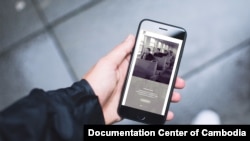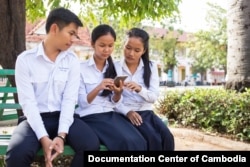The Documentation Center of Cambodia (DC-Cam) is set to launch a new interactive multimedia website later this month hosting more than 1 million publicly accessible documents related to the Khmer Rouge regime.
Pheng Pong-Rasy of DC-Cam’s genocide education project, said the new website will launch next week and is intended to be a free resource that Cambodians will be able to access from their smartphones to learn about their collective past.
While in the past the group has tried to reach people through printed written materials, Pong-Rasy believes the now-widespread use of smartphone technology means that people in remote areas of the country will easily be able to access the documents directly.
“We came up with this idea of creating a permanent website where students and youngsters of all generations could access them with their phone whenever they want. This is our main purpose,” he said.
“We created this [website] not only to target youngsters, but anyone who could see it… especially those who are living far away from town and those who have never been educated at all about Khmer Rouge history,” he added.
As well as being able to access the documents, visitors to the website can use an interactive timeline of events, from the earliest days of the party formation to the present-day Khmer Rouge tribunal hearings. The website will also feature profiles of key individuals and audio-visual materials, including rare photographs and interviews with survivors.
It will be accessible in both the Khmer and English languages and have spaces for users to leave comments and ask questions, which will be answered by DC-Cam staff.
Estimates suggest as many as 1.7 million Cambodians died under the reign of the totalitarian Khmer Rouge, which ruled the country between 1975 and 1979.
Hang Chuon Naron, education minister, said resources such as the new DC-Cam website could be valuable supplements to education in school about the history of the Khmer Rouge.
“There’s a saying, ‘if we don’t know about the history, that history will repeat itself.’ So we have to know and learn both bad and good lessons. So to be able to analyze, where do we want to go? Where are we from? To know where we should go, we need to be prepared to build the nation. So to build a nation, [we] need to know the history too,” he said.
He added that the ministry had worked with DC-Cam in the past to publish schoolbooks and conducted training for teachers and had added questions on the Khmer Rouge to national examination papers.
Latt Ky, Khmer Rouge tribunal coordinator with local rights group Adhoc, said the website would especially benefit members of the public previously unexposed to their modern history, and also civil parties to the ongoing trials of former regime officials, who would “be able to learn about their story from the relevant documents.”
The new DC-Cam website will be available at www.thekhmerrougehistory.com.











